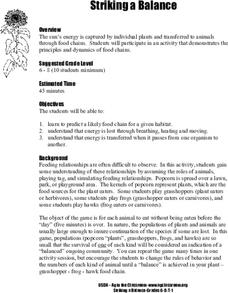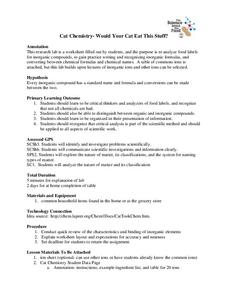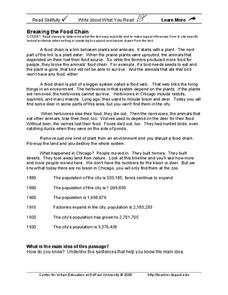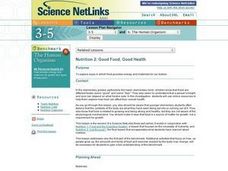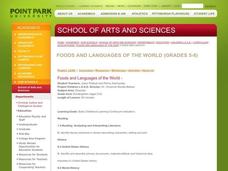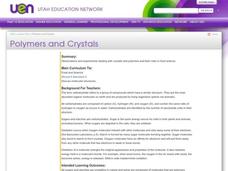Curated OER
Tastes Great-- Is It Good for You?
Students use the food guide pyramid established by the U.S. Department of Agriculture to evaluate the nutritional value of their favorite foods.
Curated OER
Sippin' on Smoothies
Why is calcium good for the body? Where is it stored? Young chefs discover the importance of calcium and review a list of foods that are rich in the material. They then make delicious smoothies high in calcium! Teaching kids how to make...
Indian Land Tenure Foundation
Native Foods and Livelihoods
Introduce young scholars to the ways in which land and people have a relationship. They examine the types of food local tribes have traditionally consumed and ways in which the people and the land both benefited from the act of...
Curated OER
Striking a Balance
Students demonstrate understanding of food chain by assuming roles of animals, playing tag, and simulating feeding relationships.
Curated OER
Striking a Balance
Students explore the many different food chains. They participate in a game in which the class is divided into the different parts of the food chain.
University of Georgia
Would Your Cat Eat This Stuff?
Processed foods use inorganic compounds for flavoring and preservation. This take-home laboratory challenges scholars to find 20 different compounds identified on the labels of foods to list on their data collection sheet. The activity...
Curated OER
Filling Up-Gasoline
In this fuel sources worksheet, students calculate the E85 alternative fuel costs per gallon compared to the cost of gasoline. Students complete a table to show the comparison prices. They create a triple line graph to show the...
Curated OER
Create a Walking Tour of San Francisco's Chinatown
Take a tour of Chinatown as it was in the 1800's. Analyzing primary source images and documents, learners will gain a better understanding of the myths and misconceptions of Chinese immigrants during the 1800's. They create a pamphlet to...
DePaul University
Breaking the Food Chain
Throughout history, the growth of big cities has resulted in the destruction of ecosystems. In the case of Chicago, IL, a grassland that was once home to bison, deer, wolves, and foxes quickly became a booming city of over three million...
Curated OER
Fresh Foods from Farm to Table
Are you a good egg? Learners begin a farm-to-table lesson by acting out verbs in groups to demonstrate the egg production process, and then research the steps using online resources. Several excellent videos are linked through the...
Curated OER
Ethical and Critical Thinking: Genetically Modified Food
Young scholars read statements representing different points of view on Genetically Modified Food. They identify the "facts" and "opinions" in each statement, and then briefly summarize the issue of Genetically Modified Food in a short...
Curated OER
Testing for Vitamin C in Different Drinks and Foods
Students examine the importance of vitamin c in their diets and the sources that it comes from. In this vitamin lesson students complete hands on activities, interpret data and make a bar graph.
Curated OER
Good Food, Good Health
Students investigate how food provides energy for the human body. In this physical health lesson, students access online resources to identify how certain foods can affect their health. Students discuss how many servings of each food...
Curated OER
Safe Food Supplies
Students answer the question how are food supplies maintained safely for human consumption? They are able to answer the following questions: what personal and pulic decisions must be made regarding the safe handling of food?, What are...
Curated OER
Microbes and Our Food
Students investigate foodborne illnesses and involved microbes. They identify major pathogens and then research and explain how they contaminate foods and how people are affected.
Curated OER
Foods and Languages of the World
Students study world cultures with an emphasis on languages and cultures. In this world cultures activity, students study the countries of Spain, China, Italy, and the United States. Students read the story Everybody Cooks Rice and move...
Curated OER
Where Does Food Come From?
Distinguish between food and non-food items. Recognize that food is obtained from both plant and animal sources. Identify sources for some common animal foods then construct a simple food path from the farm to the consumer.
Baylor College
We Need Water
There's nothing quite like a glass of ice-cold, freshly squeezed lemonade. Lesson seven of this series explains how the water humans need to survive can come in many forms. Teach your class about how much water humans require every day...
Curated OER
Polymers and Crystals: Their Role in Food Science
Blend chemistry with cooking in this exploration of polymers, carbohydrates, and food science. Experimenting with gelatin produces concrete examples of the bonding and ploymerization discussed in the lesson. Copious, comprehensive...
Curated OER
Electricity and Food: From Glowing Pickles in Citrus Batteries
Fifth graders explore electrical concepts and host a guest speaker. This lesson sets up guidelines for students to follow when they have a guest speaker. Students are primed to become actively involved in a lecture or discussion, while...
Baylor College
Energy Sources
Take the concept of burning calories to a more literal level in the second of seven lessons about energy in the realm of food and fitness. Using simple materials, groups will burn breakfast cereal and a pecan to see which one gives off...
Teach Engineering
Photosynthesis—Life's Primary Energy Source
Wouldn't it be great if you could produce your own food? Scholars learn about the processes of photosynthesis and cellular respiration in plants. They consider how to use photosynthesis as a model of an efficient system and how to apply...
Curated OER
Food Chains and Food Webs
Young scholars discuss the characteristics of producers, consumers and decomposers. Using a flow chart, they construct a food chain to visually show how organisms with different energy sources depend upon one another. Students explore...
Curated OER
Food Insecurity in a Global World: Perspectives from Africa
Learners investigate food shortages. In this global issues lesson, students examine how food scarcity issues have impacted the people of Easter Africa. Learners use the information they gather to determine methods of providing food to...
Other popular searches
- Food Sources
- Food Origins
- Aboriginal Food Sources
- Esl Food Sources
- Food Origins Of
- Science Sources of Food






